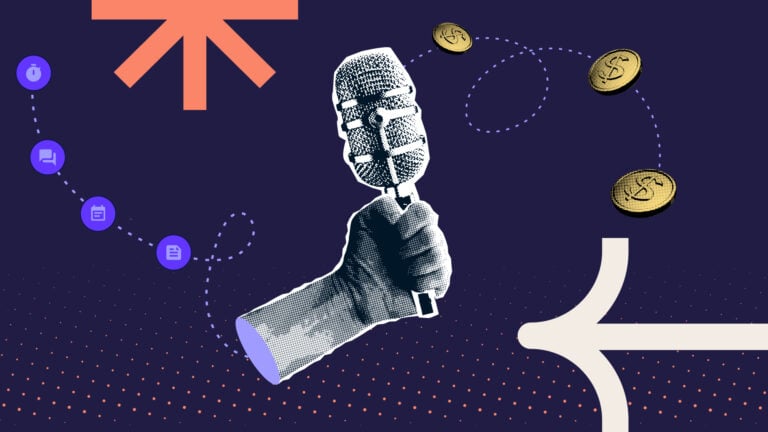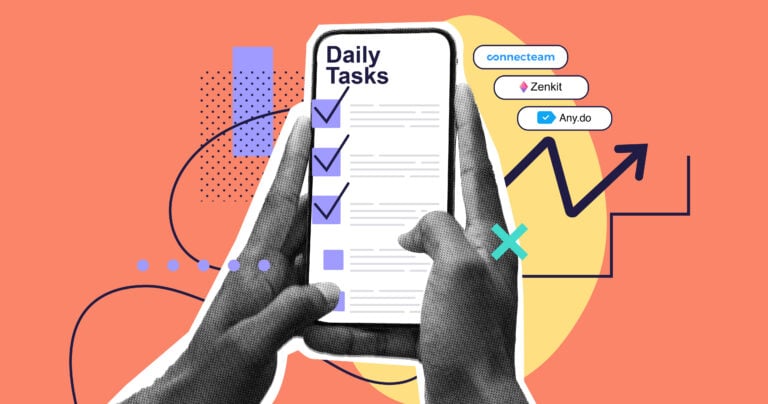Save time and money by using theatre management software to create schedules, sell tickets, get donations, and train staff. We round up the best solutions for theatres today.
To run theatre operations successfully, you need to coordinate many areas, including marketing, staffing, sales, and fundraising. This is difficult, however, if you’re using manual methods, such as spreadsheets, to keep track of people, costs, and income.
This is where theatre management software can help. It combines patron-facing ticketing and marketing functionality with internal management tools for scheduling, training, and communicating. You can also set pricing tiers for your tickets and segment your audience for targeted emails.
In addition, you can manage rehearsals and other production schedules while keeping track of hours worked by staff and creatives. Related mobile apps facilitate team notifications and instant messages on the go.
The right theatre management software will cater to your organisation’s specific needs. Read on to find the best solution for you.
Our Top Picks
-
1
Best all-in-one theatre management software
-
2

Good for marketing tools
-
3

Good for seating charts
Why trust us?
Our team of unbiased software reviewers follows strict editorial guidelines, and our methodology is clear and open to everyone.
See our complete methodology
What to Look For in a Theatre Management Software
A theatre management system (TMS) can’t guarantee you a standing ovation, but it can streamline your operations, including sales and staffing, so your team can focus on producing memorable shows. When purchasing theatre management system software, prioritize the functionality that is most important to your theatre.
Here are the top features to consider before making an informed decision.
- Employee directory: A directory stores data on staff and creatives, including name, job title, and contact information.
- Scheduling: Create schedules, and assign shifts and tasks to your team. Shift workers can clock in and out.
- Training and onboarding: New joiners and other designated users go through digital modules on topics such as health and safety.
- Ticketing: Set your seating capacity and pricing tiers, and patrons will be able to book quickly and easily on your website.
- Add-on retail: Add extra purchases to your ticket booking process, such as beverages, playbills, and merchandise.
- Fundraising: Create programs that donors can raise funds for, and get forecasts about your fundraising.
- Customer relationship management (CRM): A CRM stores and updates customer data including name, contact details, tickets booked, and amount spent.
- Email marketing: Build personalized campaigns for different customer segments to promote shows and other activities.
- Reporting: Reports help you analyze insights such as ticketing and fundraising income, customer demographics, and hours worked by employees.
- Mobile app: Most theatre management mobile apps can only be used to scan tickets at the door. However, some include scheduling and reporting functionality.
The 8 Best Theatre Management Softwares of 2026
-
Connecteam — Best all-in-one theatre management software
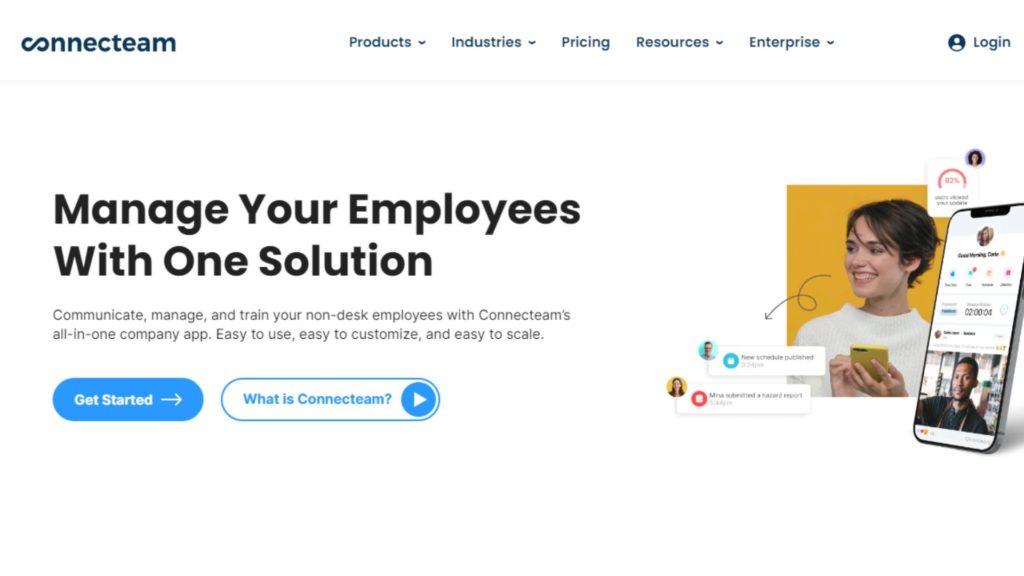
Connecteam’s theatre management software provides theatres with rich functionality to manage artists and staff details, track shifts and hours worked, and complete tasks. It also enable you to communicate instantly, provide training, and solve other operational problems such as requesting e-signatures.
To organize what and who is needed for rehearsals and shows, create a schedule with Connecteam’s intuitive interface and assign tasks to staff and crew. People are notified about their schedules in real time, ensuring a smoother production process. You can also automate shifts and tasks, and use the time clock to track hours worked, for greater overall efficiency.
Unlike many theatre management solutions, Connecteam features an employee directory that tracks data for employees, artists, and contractors, including job titles, phone numbers, and other customizable fields you wish to add. Users can update their details in the app, search the database by name and job title, and send each other instant messages.
Theatres can use the forms and checklist app to create and e-sign essential paperwork, such as health and safety checks and onboarding documents. Pair that with the training feature, which lets you customize modules for various topics, like fire safety or equipment use. Statistics on training progress tell you if your workforce is up to speed.
Many theatres are going paperless to be more agile and environmentally conscious. Conveniently, Connecteam includes document storage and management, so you can sync new document versions on the cloud, set user permissions, and share specific files with users in your directory. For example, you can include must-read company policies and automatically upload signed employee contracts.
While Connecteam doesn’t include ticketing and CRM features, it does include an event management app. You can use it to set up rehearsals and other production events. Those invited get instantly notified and can confirm attendance, ask questions, and add comments to the event feed.
Finally, a major differentiator for Connecteam in the theatre industry is its mobile app functionality. Staff and creatives are often deskless, so being able to update schedules, view tasks, and communicate on the go is crucial to keeping operations efficient. Not only that, but the user-friendly design makes the Connecteam app a pleasure to use.
Connecteam also offers a free for life plan – Get Started Now!
0Key Features
Pros
Employee directory functionality
Smooth onboarding and scheduling
Reach coworkers via chat
User-friendly mobile app
Cons
No audience-facing features
Pricing
Free-for-life plan availablePremium plans start at $29/month for 30 users
14-day free trial, no credit card required
Start your free trial -

AudienceView Professional — Good for: Marketing tools
Available on
- Web
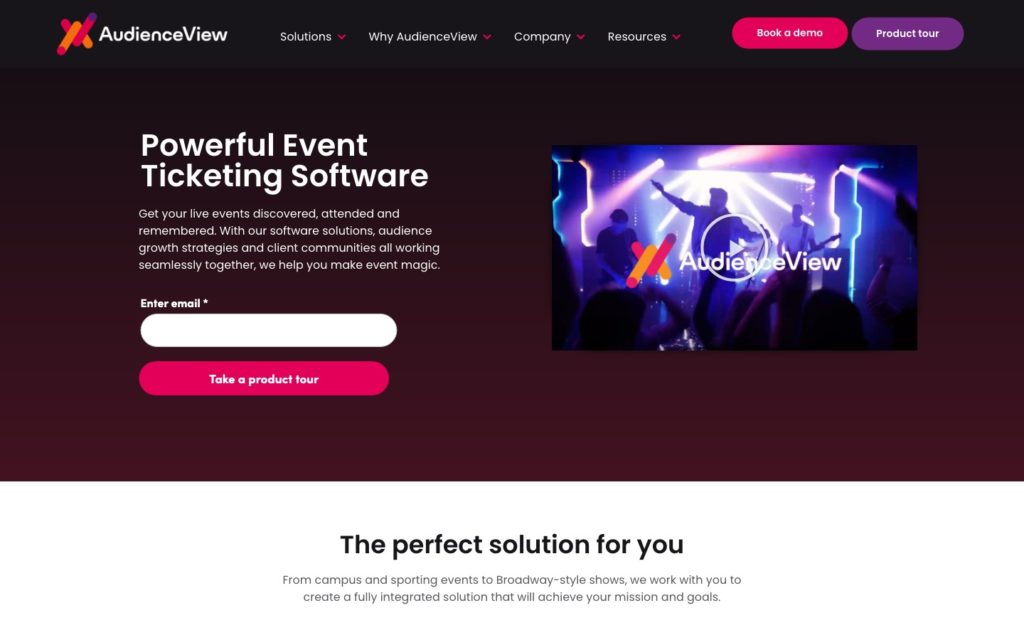
AudienceView Professional is an all-in-one theater management system with marketing, fundraising, CRM, and ticketing features. It helps you manage customer data effectively so you can get more donations, sell more tickets, and offer audiences a great pre-show experience.
An attractive feature is the ability to sell your tickets via AudienceView’s consumer-facing websites, Theatremania and WhatsOnStage, and its mailing list of over 1.8 million subscribers. Its Campaign Manager tool helps you create ads on these platforms, helping expand your customer reach and increase your sales.
In your account, you can create events and set up per-seat dynamic pricing, allowing seat prices to vary with demand. Your CRM includes current and past customers, and their engagement with your company, such as emails opened and tickets purchased.
The reporting feature provides insight into your customers, donors, sales, and ad performance. This is useful input for your finance department’s return on investment (ROI) calculations and future show budgeting.
Key Features
- Ticketing
- Fundraising
- CRM
- Marketing
Pros
- Marketing on AudienceView’s consumer platforms
- User-friendly ticketing tool
Cons
- No employee management features
- No mobile app
Pricing
Pricing is not publicly available Trial: No Free Plan: No
-

ThunderTix — Good for: Seating charts
Available on
- Web
- iOS
- Android
- Windows
- Mac
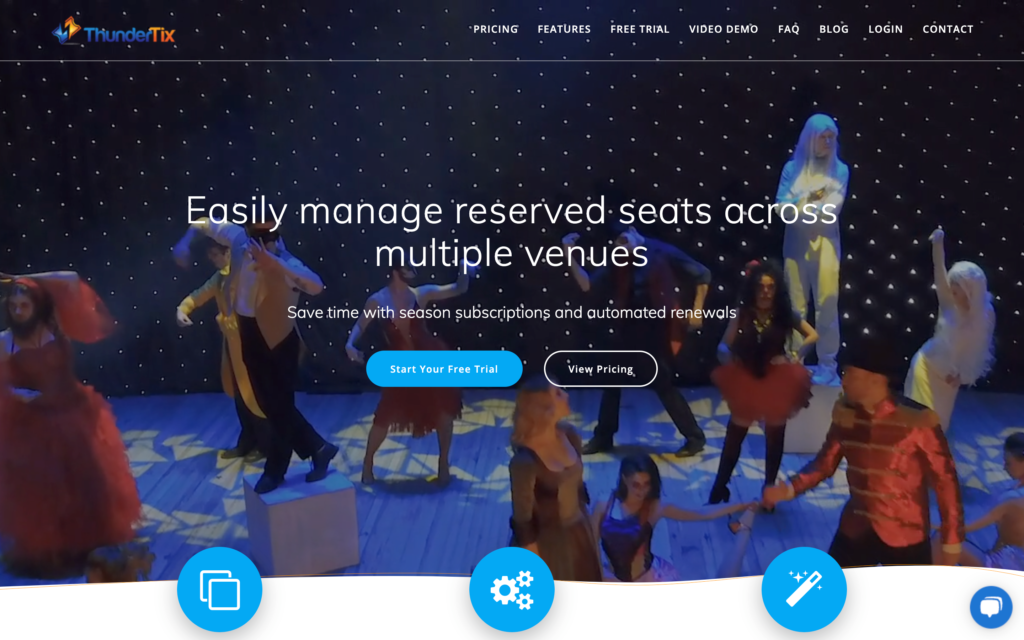
ThunderTix is a theater management software specializing in ticketing tools such as personalized seating charts, ticket promos, merchandise, ticket printing, and barcode scanning. In addition, fundraising functionality allows patrons to donate once or regularly, and tracks these funds separately from box office sales.
The reporting dashboard gives you insight into metrics including revenue, donations, coupons, and new customers for each of your events.
Marketing features are limited, and you pay a relatively expensive 1¢ per email—which, with thousands of patrons, can lead to a hefty bill. You also need to pay an upfront $145 to set up the mass email feature. However, transactional emails, such as those confirming ticket purchases, are free and automated.
Key Features
- Seating charts
- Ticketing
- Fundraising
- Mass emails
Pros
- Personalized seating charts
- Barcode scanning
Cons
- High setup fees
- Limited marketing functionality
Pricing
Starts at $20/month Trial: Yes Free Plan: No
-
Tessitura — Good for: Established theatres
Available on
- Web
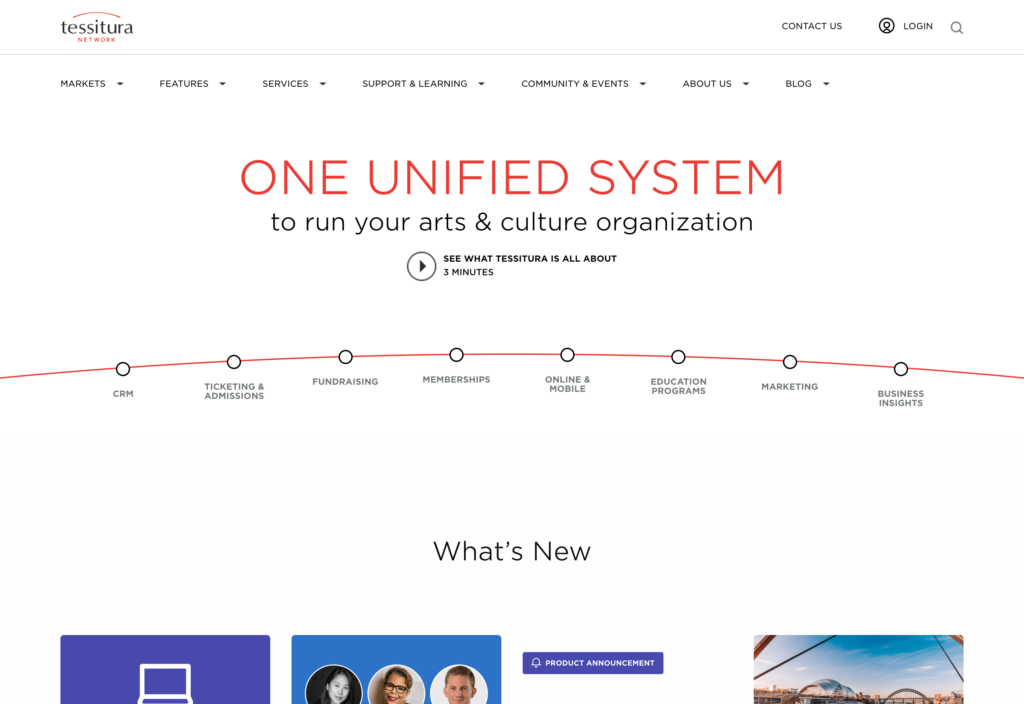
Tessitura combines ticketing, marketing, and CRM functionality with unique features to manage education programs, monthly memberships, and add-on purchases such as parking and beverages. You can activate dynamic pricing and conduct advanced email marketing campaigns using A/B testing.
Tessitura is a good choice for larger theatres that rely on multiple revenue streams, not just ticketing and donations. With its ability to market and sell food and beverages, integrate with point of sales (POS) systems, and bundle different products for a discount, it facilitates higher sales in a user-friendly interface.
Uniquely, it supports membership features, which can enable theatres to get creative with their business models. For example, membership may include a free drink and a discounted ticket at each performance. Tessitura’s reporting feature includes 12 dashboards focusing on sales, attendance, and other key insights.
Key Features
- Ticketing
- Retail sales
- Marketing and CRM
- Memberships
Pros
- Add-on product sales
- Advanced reporting
Cons
- No HR features
- No mobile apps
Pricing
Contact vendor for price Trial: No Free Plan: No
-

PatronManager — Good for: Customizable CRM
Available on
- Web
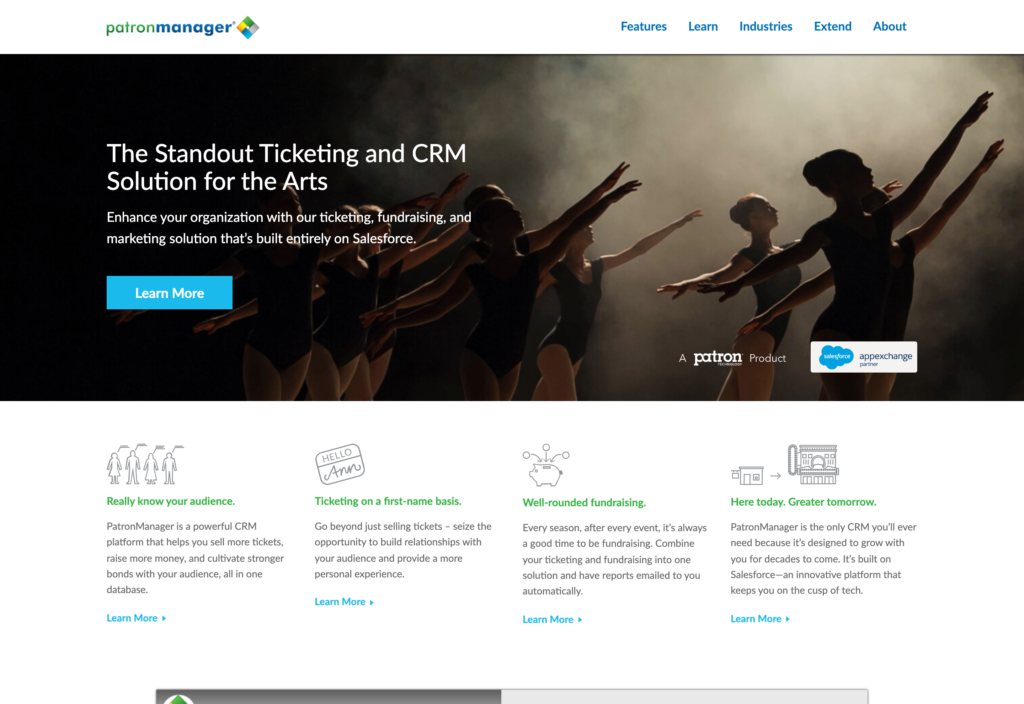
The main features on PatronManager are ticketing, fundraising, and marketing. The glue that makes these tools work well together is the Salesforce-powered CRM, which is highly customizable and provides deep sales insights.
For example, Salesforce allows you to create sales goals and pipelines, and can integrate with the email marketing tool to target specific customer groups for different shows. In addition, it includes an internal communications tool, Chatter, where you can post on news feeds and share customer records with colleagues.
While strong on the CRM front, PatronManager does not have a modern or intuitive interface, so it has a learning curve. Also, its reporting and analytics feature isn’t as vast as that of other competitors.
Key Features
- Salesforce-based CRM
- Ticketing
- Marketing
- News feed
Pros
- Internal communications
- Powerful Salesforce CRM features
Cons
- Unintuitive interface
- Limited reporting
Pricing
Contact vendor for price Trial: No Free Plan: No
-

Arts People — Good for: Promotional ticketing
Available on
- Web
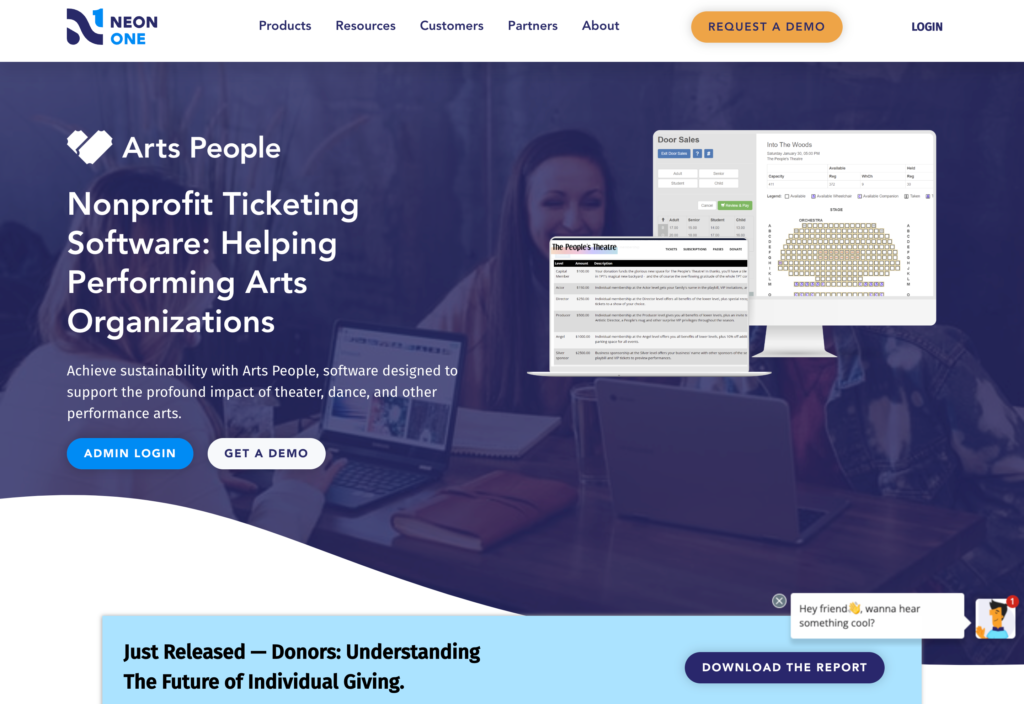
Arts People provides a combination of ticketing, fundraising, and marketing tools to help you fill seats and manage your box office. Theatre-specific features include pricing tiers based on factors like the day of the week, and flex passes including promo discounts and complimentary tickets.
With fundraising, you’re able to create specific campaigns that donors engage with and market them to targeted audiences in your contact database. For example, the email marketing tool can segment patron lists based on criteria such as previous amounts spent.
The database feature isn’t very advanced, but Arts People’s parent company, Neon One, has a donor-focused CRM solution that includes workflow automation, KPI tracking, and over 40 pre-built analytics reports.
Key Features
- Ticketing
- Fundraising
- Marketing
- Database
Pros
- Email marketing
- Rule-based ticketing
Cons
- Limited reporting
- Limited CRM
Pricing
Contact vendor for price Trial: No Free Plan: No
-
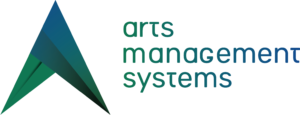
ArtsMan Theatre Manager — Good for: End-to-end venue management
Available on
- Web
- Mac
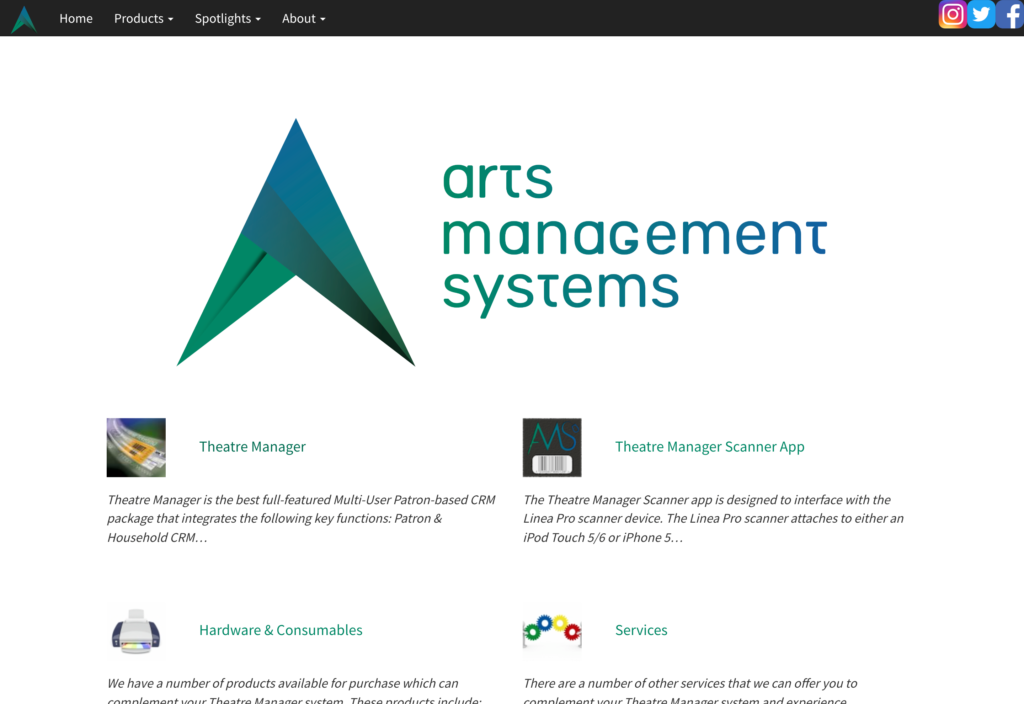
ArtsMan Theatre Manager has a comprehensive set of features, from CRM and ticketing to employee management, project management, and even press and media tools.
The features are customizable. For example, you can have seat charts that locate the “best available seat” and create CRM contact fields according to your marketing needs. When managing donors, you can add notes and assign to-do items to maximize donation rates.
Significantly, ArtsMan Theatre Manager includes staff, artist, and volunteer management, with features such as a database with names and job types, evaluation tracking, production and cast lists per show, and hours and wage tracking. Having labor costs and income figures side by side in the same platform helps you budget and estimate profitability.
One big downside to the product is its outdated interface, which isn’t intuitive to use and can slow down theatre managers’ productivity. In addition, it isn’t cloud-based, and the data is stored locally on your computers, creating an increased risk of losing customer and sales data.
Key Features
- CRM
- Box office management
- Artist and staff management
- Project management
Pros
- Comprehensive theatre management features
- Staff management
Cons
- Dated interface
- Risk of data loss due to local storage
Pricing
Contact vendor for price Trial: No Free Plan: No
-

Hubworks — Good for: Inventory management
Available on
- Web
- iOS
- Android
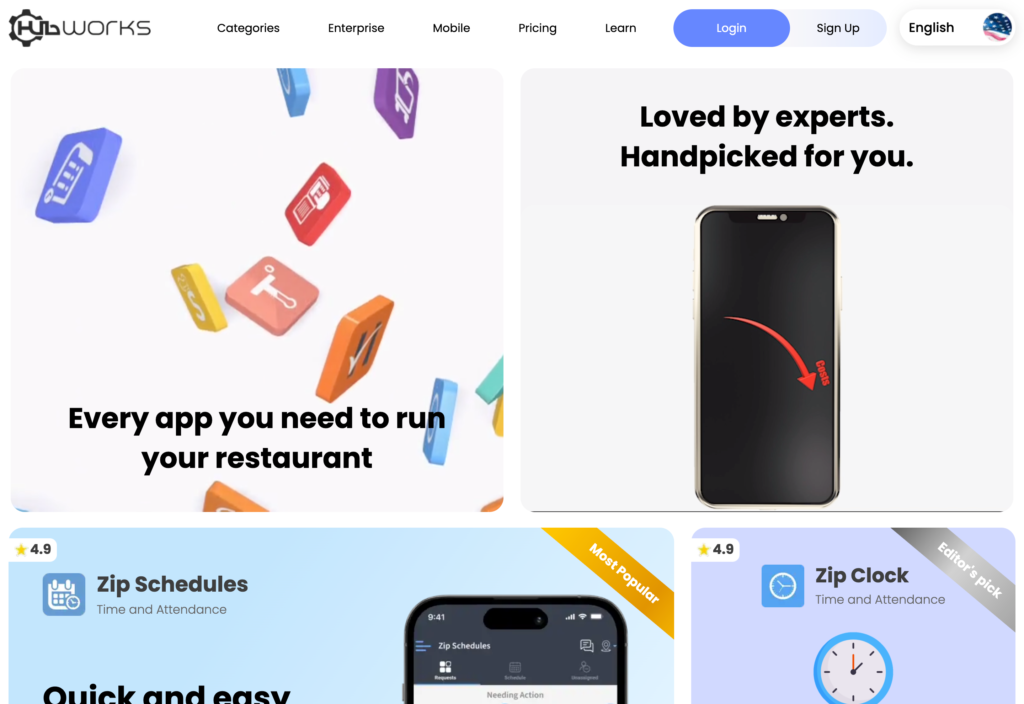
Hubworks is business management software supporting theatres with operational tools including task management, employee scheduling, inventory management, and POS data. Though you can’t sell tickets, you do get access to real-time sales data via your POS system. You can also produce reports focusing on key metrics and even forecast future sales.
In addition to its theatre-focused features you get inventory management—for example, you can keep track of costumes, sets, and props. Also, to manage your workers’ shifts, tasks, and time, use the Schedules, Clock, Checklist, and Shiftbook features.
Hubworks offers several Android and iOS mobile apps for timekeeping, inventory, scheduling, and more. As a downside, though, you need to jump between them, as there is no unified app. While not currently available, Hubworks will soon release features for email marketing and the option to integrate with third-party software.
Key Features
- Scheduling
- Time tracking
- POS reporting
- Inventory management
Pros
- Mobile apps for Android and iOS
- Employee scheduling and time clock
Cons
- Cannot integrate with other software
- No ticketing capability
Pricing
Contact vendor for price Trial: No Free Plan: No
Compare the Best Theatre Management Softwares
| Topic |
 Start for free
Start for free
|

|

|
|

|

|

|

|
|---|---|---|---|---|---|---|---|---|
| Reviews |
4.8
|
3.2
|
4.7
|
4.2
|
4.4
|
4.6
|
4.1
|
4
|
| Pricing |
Starts at just $29/month for the first 30 users
|
Pricing is not publicly available
|
Starts at $20/month
|
Contact vendor for price
|
Contact vendor for price
|
Contact vendor for price
|
Contact vendor for price
|
Contact vendor for price
|
| Free Trial |
yes
14-day
|
no
|
yes
|
no
|
no
|
no
|
no
|
no
|
| Free Plan |
yes
Free Up to 10 users
|
no
|
no
|
no
|
no
|
no
|
no
|
no
|
| Use cases |
Best all-in-one theatre management software
|
Good for: Marketing tools
|
Good for: Seating charts
|
Good for: Established theatres
|
Good for: Customizable CRM
|
Good for: Promotional ticketing
|
Good for: End-to-end venue management
|
Good for: Inventory management
|
| Available on |
Web
|
Web, iOS, Android, Windows, Mac
|
Web
|
Web
|
Web
|
Web, Mac
|
Web, iOS, Android
|
What Is Theatre Management Software?
Theatre management software is a set of tools that helps theatres manage different aspects of their business, including staff scheduling, training, ticket sales, customer databases, marketing activities, and internal communications.
The performing arts sector has specific needs, which is why using dedicated software is important. Examples of theatre-oriented features include being able to set up rehearsals in an internal event management app and add donation requests to ticket booking systems.
How Does Theatre Management Software Work?
Theatre managers can create an event section for each of their shows, then set up rules for each show’s ticket pricing, such as “$100 per seat in the stalls” and “$50 per seat in the circle.” Promotional offers can be added, such as “20% off for under-25s.”
You can add other retail products into the mix, including food and drinks, playbills, and merchandise. To achieve donation targets, create fundraising programs to target various donor interests—for example, “support new writers.”
When a new employee or creative joins, add them to the employee directory, and they can provide further details, such as their phone number. Create schedules and shift patterns for each production and assign tasks to individuals, which they tick off when completed. Compulsory training and onboarding modules, like health and safety guidelines, can be assigned to specific users.
The Benefits of Theatre Management Software
Using a software solution to manage your theatre’s operations is highly beneficial. You can save costs and time by doing less admin, and increase your ticket sales by giving patrons a smooth booking journey.
Here is a summary of the top benefits you can get.
- Lower cost: Using software to automate shifts, set ticket pricing tiers, and mass email audiences means lower labor costs paid for manual administrative tasks.
- Freed up time: As they’re not processing ticket orders manually or tracking artist hours in a spreadsheet, your office staff can spend their time on strategic planning.
- Higher income: A ticket booking and donation system that’s quick and easy to use, paired with effective marketing, increases your box office and fundraising revenues.
- Better customer experience: Audiences appreciate a well-designed interface, with clear pricing tiers and a smooth booking process.
- More targeted marketing: The CRM tracks important customer data, like previously booked shows, while email marketing tools help build targeted campaigns.
- Clearer schedules: Productions run more smoothly when an app tells staff and creatives what they need to do, when, and where.
📚 You might be interested in reading:
- The best employee training software of 2026
- The best employee scheduling apps of 2026
- The top employee time tracking software for 2026
How Much Does Theatre Management Software Cost?
In many cases, you need to speak to theatre management software providers directly to get a quote. The price depends on the size of your institution, including your box office revenue and the number of shows performed annually, as well as your required features and budget.
For solutions that include ticketing features, you may pay a flat monthly fee and a percentage commission or fee per ticket sold. For example, Thundertix plans start from $20/month + $1 per ticket (first 20 tickets free).
If the software includes employee management features, it may charge a flat monthly fee and an added per-user fee. Connecteam offers the best value for money in this category, with $29/month (first 30 users) + $0.5/month/user thereafter.
Some providers offer a free trial on their paid plans, but not many include a free plan. Connecteam, however, allows up to 10 users on its forever-free plan.
FAQs
The operations behind arts management are substantial, from selling thousands of tickets to managing staff, crew, and creatives. Theatre management software streamlines administrative and sales activities, so your institution can save time and focus on creating great shows.
Theatre management software comes at a price, but the cost and time savings it creates make it worth it. You can step away from tracking schedules and customer details in spreadsheets and give patrons a great booking experience with theatre-specific ticketing.
To use theatre management system software effectively, keep customer records up to date, create clear pricing tiers, and personalize marketing campaigns according to audience segments. In addition, create a production schedule, assign shifts and tasks, and give staff appropriate training.
The Bottom Line On Theatre Management Software
Theatre management software supports operational activities from staff training to scheduling and time tracking, as well as ticketing, fundraising, and other patron-facing requirements. Theatre-oriented features, such as demand-driven dynamic pricing, help improve customer experience, on top of decreasing admin costs and increasing revenues.
Some solutions focus exclusively on ticketing, fundraising, and marketing, while others additionally cover internal tools such as an employee directory, training modules, and instant messaging. Connecteam is the top value-for-money solution in this space, with a low per-user fee and a 100% free plan for small businesses with up to 10 users.

